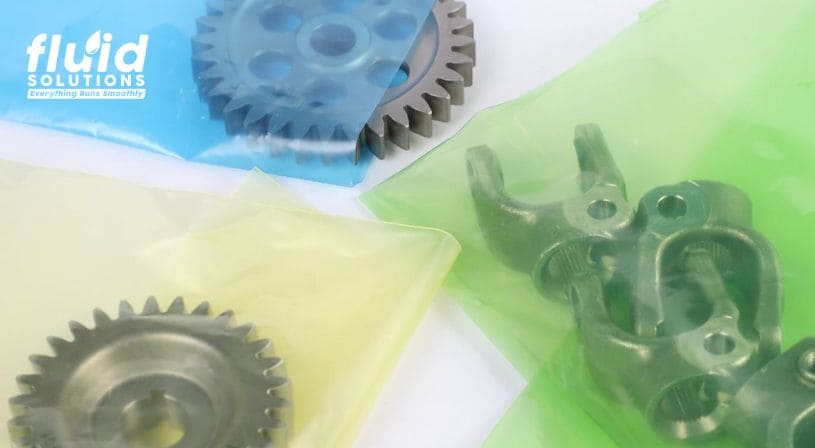
Corrosion is a significant challenge for industries that rely on metal components. Over time, rust and corrosion can weaken materials, leading to costly repairs or replacements. To combat this, many companies are turning to Volatile Corrosion Inhibitors (VCIs), a cutting-edge technology that provides reliable corrosion prevention without the mess or environmental impact of traditional oil-based coatings.
In this guide, we’ll explore how VCI papers and plastics work, their advantages, and why they have become a popular choice for rust prevention in the metalworking industry.
Why use VCI papers and plastics?
The use of VCI papers and plastics has grown significantly in recent years, offering an innovative solution for protecting metal parts from corrosion. Historically, oil-based anti-rust coatings were the standard for rust protection. However, as industries move towards more sustainable and efficient processes, VCIs have emerged as a viable alternative.
Primarily used for steel and other ferrous materials, VCI products are also available for non-ferrous metals such as aluminum and copper. These corrosion prevention solutions are especially popular for wrapping metal components during storage or transport, ensuring rust protection, until when the package is opened.
How VCI Papers and Plastics Work
VCI papers and plastics are engineered with volatile corrosion inhibitors that release protective vapors. Here’s how it works:
- Impregnation with VCI Additives: VCI papers and plastic films are coated or impregnated with specialized VCI compounds. The type of VCI additive used is selected based on the specific metal being protected. For example, steel may require a different formulation than aluminum or copper.
- Vapor Emission: Once the metal part is wrapped in VCI paper or plastic, the VCI additives emit vapors that fill the surrounding air space within the packaging.
- Adsorption onto Metal Surfaces: VCI vapors are adsorbed onto the metal surface, forming a thin, protective layer that prevents rust and corrosion.
- Protection Until Unpacking: The VCI layer remains intact until the package is opened. Upon opening, the vapors dissipate, leaving behind a clean, rust-free surface. Unlike traditional oil coatings, there is no need for degreasing or cleaning before the metal part can be used.
This innovative approach allows for rust protection without the mess or hazards associated with oil-based products, making it an ideal choice for industries looking to improve efficiency and environmental safety.
Advantages and Benefits
The two primary advantages of using VCIs are the following:
- The elimination of anti-rust oil, or at least the reduction of its usage – while proven to be also effective in protecting metals, oils or liquids present environmental concerns, as they must be disposed of properly once their efficacy diminishes. In addition, certain chemicals or components of the anti-rust oils may be considered as health hazards, in relation to skin contact and inhalation. VCI papers and plastics on the other hand, at least those from reputable manufacturers, have been tested to be safe for both humans and the environment. Reducing the use of oils clearly reduces overall costs of production, which is a big consideration for most companies.
- Streamlining of processes – if the use of anti-rust oils is eliminated in favor of utilizing VCIs, then one step in the manufacturing process is removed. The process to provide rust protection AND packaging is consolidated into one single step, freeing up manpower to focus on more productive tasks as well as improving the overall cycle-time for production.
Metalworking Fluids Manufacturers and Corrosion Prevention
Choosing high-quality VCI products is essential for effective corrosion prevention. Reputable metalworking fluids manufacturers like Fluid Solutions offer a range of rust-preventive VCI tailored to various metals and applications.
Fluid Solutions also offers a comprehensive lineup of industrial lubricants and rust preventives, designed to meet the diverse needs of the metalworking industry. Contact Fluid Solutions today at (02) 8370 5928 / (0917) 894 9156 or via email at inquiry@fluidsolutions.com.ph.


